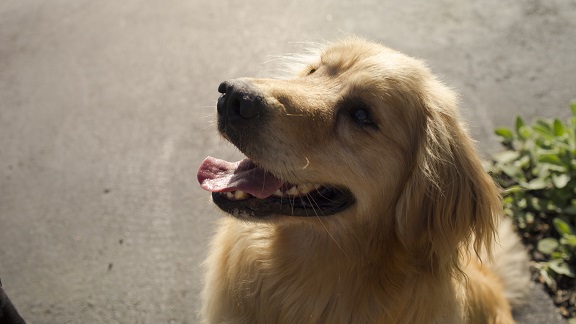Featured at June 5 Animal Survivor Event 2014 ACVIM Forum, Nashville, Tennessee
(Nashville, Tenn.) When Spur, a young golden retriever, was first presented to Dr. Danielle Bayliss, a Cordova, Tenn. veterinary specialist, prospects weren’t good for the 85-pound animal. Dr. Bayliss is a Board-certified specialist who earned her certification with the American College of Veterinary Internal Medicine.
He was in “very critical condition,” Bayliss recalls, due to fungal pneumonia. “The infection had severely compromised his lungs and he was experiencing trouble getting enough oxygen. His breathing was very rapid and labored and he was dehydrated. And he was exhausted from simply trying to breathe.”

Brister Shum, of Germantown, Tenn., owner of the show-quality dog, along with her husband, Steve, adds, “It was touch and go there for a while. We noticed around Thanksgiving that his coat was dull. By Christmas, he was beginning to show signs something was seriously wrong. His left eye was inflamed and he quit eating so we got him to our veterinarian (Dr. William Kenney). He was a two-year-old dog acting like a 13-year-old.
“At that point it was a matter of trusting my instincts and making certain Spur received the best and quickest treatment possible. It’s a feeling mommy’s have.”
Kenney referred Spur to Dr. Bill Miller, a veterinary ophthalmologist at Memphis Veterinary Specialists, where Bayliss also practices. After examining the eye, Miller suspected the dog had Blastomycosis (fungal infection) and recommended several tests be performed by Kenney. Those confirmed Miller’s suspicions and the ailing Spur was promptly referred back to the hospital’s internal medicine service when his lungs became compromised.
Spur required oxygen support for the first several days of his seven-day hospitalization. “Initially we put tubes in Spur’s nose,” Bayliss explains, “to deliver oxygen but he did not tolerate them so we moved him into an oxygen cage where he lived for five days while we provided intensive care, anti-fungal medications, antibiotics for a secondary bacterial infection and medications to open his airways.”
He also received anti-inflammatories to prevent his body from overreacting to the dying fungal organisms. In addition to pneumonia, the Blastomyces organisms infected Spur’s eye, requiring eye drops.
The initial work and care provided by the other two veterinarians, Bayliss emphasizes, greatly facilitated Spur’s eventual treatment and allowed the hospital team to move forward quickly without having to wait for test results.
The fungal organism Blastomyces dermatitidis responsible for Spur’s disease is endemic in this area of the country. Dogs that live near water have a higher risk of exposure, according to Bayliss. The fungus grows in moist soil or vegetation and thrives in riverbanks, lakes and swamps where damp soil lacking direct sunlight fosters growth of fungi. Still it is relatively uncommon, and at her clinic fewer than 10 cases a year are seen.
Spur visits Bayliss every two to four weeks for checkups but that frequency will be extended as he continues his recovery. He continues to receive medications and his long-term prognosis is good.
Left untreated, a Blastomycosis infected dog would likely die. For those with delayed care for an eye infection, ocular Blastomycosis can cause permanent blindness.
A now healthy Spur and his veterinary treatment team, along with his owners the Shums, will be introduced at the 2014 ACVIM Forum in Nashville, Tennessee at 10:00 a.m. Thursday, June 5. This special Animal Survivor event will be held in the Exhibit Hall at the Gaylord Opryland Resort & Convention Center. Members of the media are invited to attend.
Animal Survivors have beaten the odds because of advances in veterinary internal medicine. The animal owner, general practitioner and an ACVIM Board-certified veterinary specialist work in partnership to help these animals overcome life-threatening illnesses to lead a healthy life once again. Each animal has a unique story of survival made possible by specialty veterinary medicine. Visit www.acvim.org for more information.
Media Note: Accredited members of the media may attend the 2014 ACVIM Forum at no charge. However, you are required to register with the ACVIM. For media registration, please fill out a registration form or contact Laurie Nelson at Laurie@ACVIM.org or 303.231.9933.
On-site Press Room Location: Gaylord Opryland Resort & Convention Center Hours: Wednesday June 4, 2:00–5:00 pm Thursday June 5, 8:00 am–5:00 pm Friday June 6, 12:00–5:00 pm Saturday June 7, 8:00 am–12:00 pm
# # #
About the American College of Veterinary Internal Medicine (ACVIM)
The American College of Veterinary Internal Medicine (ACVIM) is a nonprofit organization dedicated to improving the lives of animals and people through education, training and certification of specialists in veterinary internal medicine, discovery and dissemination of new medical knowledge, and increasing public awareness of advances in veterinary medical care.
The ACVIM is the certifying organization for veterinary specialists in cardiology, large animal internal medicine, neurology, oncology and small animal internal medicine.
To find an ACVIM specialist in your area, please visit www.ACVIM.org.
CONTACT:
Laurie Nelson
Marketing Manager
Office: 303.231.9933
Cell: 303.324.2630
Laurie@ACVIM.org

